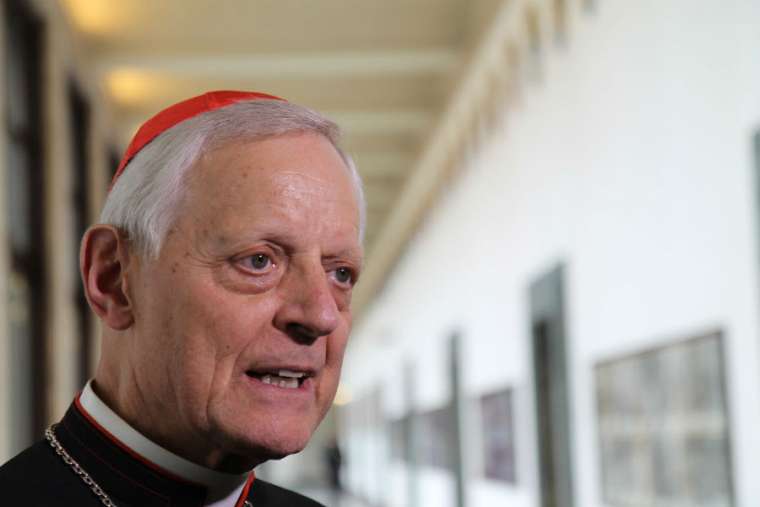WASHINGTON, D.C. – Cardinal Donald Wuerl has laid out his vision for lay participation in new oversight structures as part of the ongoing response to recent scandals in the Church in the United States. He is one of several bishops pressing for collaboration between laity and bishops to ensure accountability in the Church hierarchy.
Writing on the website of the Catholic Standard, the magazine of the Archdiocese of Washington, Wuerl said that there was a well-established theological framework for greater lay participation as the Church faced the “current challenging situation and seek some structural and authentically Catholic response.”
Referring to the widespread sexual abuse crisis at the beginning of the millennium, during which there was an outcry at the failure of dioceses to respond properly to allegations of abuse, the cardinal said bishops had acted to make meaningful changes.
“In 2002, when we faced the terrible crisis of clergy child abuse, the bishops produced the Charter for the Protection of Children and Young People. Later that same year, the ‘Essential Norms,’ created to implement the Charter, were also approved, by both the bishops and the Holy See.”
In recent weeks the credibility of the Dallas Charter has been questioned by many commentators, who have pointed out the prominent role Theodore McCarrick played in drawing up its provisions and speaking out against abuse.
Others have noted that the failure to apply the Charter and Essential Norms to bishops as well as priests and deacons was deliberate. While this was done following legitimate questions about the authority of the U.S. bishops’ conference to pass binding rules for dealing with bishops, in hindsight it appears to have further tainted the work of 2002.
But Wuerl said that much practical good was achieved in Dallas and in the years that followed, noting that even the most recent crises concern past and not contemporary allegations.
“It seems fair to say that the Charter worked and continues to work. Almost all of the cases of clergy abuse that we hear today are from a period of time prior to the Charter.”
Wuerl said that many of the Dallas reforms could be adapted or expanded to include the consideration of allegations made against bishops.
“A key component in the implementation of the Charter for the Protection of Children and Young People is both the National Review Board that oversees diocesan compliance with the Charter, and the local diocesan review boards that review allegations with a view to determining their credibility. What would be helpful today is that the same type mechanism be now made available when dealing with allegations of abuse or misconduct by a bishop.”
The cardinal made the specific suggestion that one or more such boards be created, with membership including laity, men and women, as well as bishops. These could be established “either at the national level or at the regional or provincial level” and be charged with assessing the credibility of accusations made against bishops.
“It seems that at the service of both accountability and transparency, such boards that reflect the makeup of the Church, laity and clergy, would help to highlight this new level of accountability,” Wuerl wrote.
“The results or findings of these review boards would be presented to the Holy See’s representative, the Apostolic Nuncio. Thus there would be clearly the recognition that the final judgment rests with the divinely established head of the College of Bishops, the Bishop of Rome.”
Other bishops, like Bishop Edward Scharfenberger of the Diocese of Albany, have made their own calls for increased lay participation in assessing allegations of bishops. In Scharfenberger’s case, he suggested a lay-led panel be formed, independent from the hierarchy, saying that “to have credibility, a panel would have to be separated from any source of power whose trustworthiness might potentially be compromised.”
In setting out his own proposal Wuerl emphasized that the bishops and faithful were part of the one Body of Christ, and that bringing accountability would be a mutual endeavor.
Both proposals come ahead of the next general session of the United States Conference of Catholic Bishops in November, to be held in Baltimore.
Wuerl has previously said that it would be unacceptable for bishops to wait until then to propose responses to the crisis, telling the National Catholic Reporter that “We need to be doing things in anticipation of November so that when we get to November … we would go into this meeting with a lot of work already done and a lot of testing of the ideas already in place.”
So far, the discussions have focused on how to involve laity in an eventual new structure or process, but others have questioned whether any process involving American bishops can be credible.
One canon lawyer who has worked on sexual abuse cases which involved American bishops in the process told CNA they were unconvinced.
“If there is going to be a proper tribunal [panel of judges] for a case against an American bishop, the last people I would want involved are other American bishops,” the canonist said.
“However good their intentions, I would always have concerns about their objectivity when dealing with these issues – because of personal connections and because the issue of sexual abuse is so charged in the American Church.”












